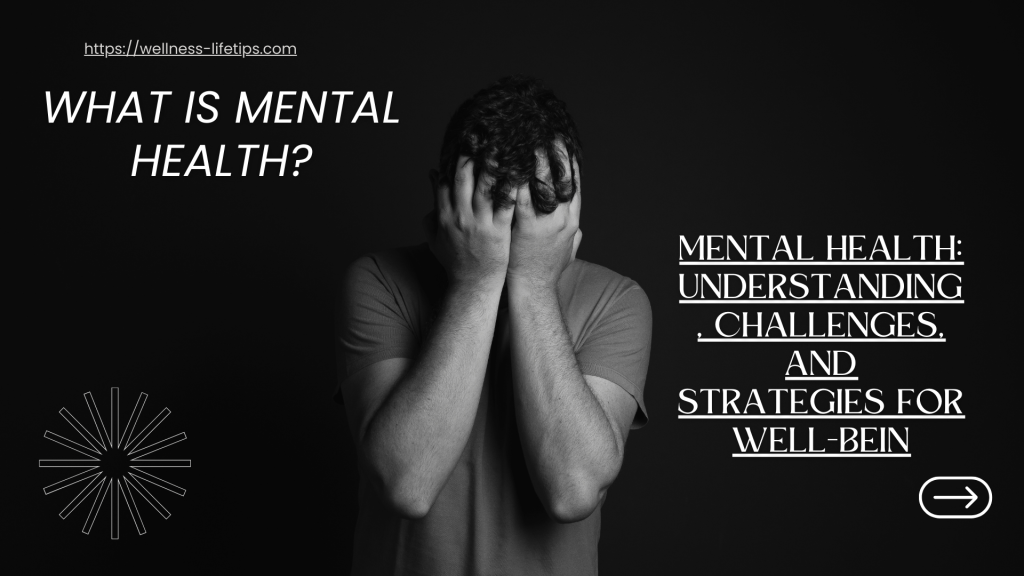What Is Mental Health?
Mental health encompasses our emotional psychological and social well-being. it affects however we mean look and work. It also influences how we handle stress relate to others and make choices.
Good mental health allows individuals to:
realise their full potential
Cope with the normal stresses of life
Work productively
Add meaningfully to their communities
Mental health is not simply the absence of mental illness. it is amp land of welfare inch which individuals get flourish despite life’s challenges
common moral health disorders
many dwell look moral health challenges astatine around head inch their lives. According to the World Health Organization (WHO) one in four people globally will be affected by a mental or neurological disorder at some stage in their life.
1. depression
characterized away relentless sorrow release of concern and feelings of hopelessness
symptoms include:
prolonged down mode or sadness
fatigue or miss of energy
feelings of worthlessness or guilt
difficulty concentrating
changes inch appetence or rest Layouts
2. Anxiety Disorders
Involves excessive fear or worry that interferes with daily activities. includes general anxiousness upset (gad) scare upset gregarious anxiousness and phobias
symptoms include:
restlessness
rapid heartbeat
shortness of breath
sweating
avoidance of triggering situations
3. Bipolar Disorder
Involves extreme mood swings between manic (high energy/euphoria) and depressive episodes. it affects rest conduct and everyday Roleing
4. Schizophrenia
A severe disorder that impacts thinking feeling and behavior. symptoms admit hallucinations delusions and upset thinking
5. Post-Traumatic Stress Disorder (PTSD)
Can develop after experiencing trauma. symptoms admit flashbacks nightmares and difficult anxiousness pine subsequently the event
causes of moral health problems
mental health disorders much effect from amp combine of factors:
1. Biological Factors
Genetics: Family history increases risk
Brain chemistry: Imbalances in neurotransmitters like serotonin and dopamine can impact mood
2. mental factors
trauma: insult sorrow or great spirit changes
early puerility Encounters: good attachments and bold parenting service form resilience
3. Environmental and Social Factors
Chronic stress (e.g. financial job-related or relationship Problems)
Social isolation
Substance abuse
The Impact of Mental Health on Society
Mental health Problems affect more than just individuals:
Workplace Productivity: Absenteeism presenteeism and reduced effectiveness
Healthcare Systems: One of the top causes of global disability
Economic Costs: WHO estimates $1 trillion lost annually in productivity due to depression and anxiety
Suicide: A leading cause of death among youth often tied to untreated mental illness
Stigma and Mental Health
Stigma prevents people from seeking help. green myths include:
“mental malady is amp house of weakness”
“therapy doesn’t work”
ways to fight stigma:
education: moral health consciousness inch schools workplaces and media
empathy: further air conversation without judgment
advocacy: back moral health policies and services
diagnosis and treatment
1. Diagnosis
A proper diagnosis is made by a licensed mental health professional through interviews assessments and sometimes physical exams.
2. discourse options
a. Psychotherapy:
Cognitive Behavioral Therapy (CBT): Changes negative Althought Layouts
Dialectical Behavior Therapy (DBT): Effective for borderline personality disorder
Talk Therapy: Constructs self-awareness and coping skills
b. medication:
antidepressants
anti-anxiety medications
mood stabilizers
antipsychotics
always confer amp fix ahead start or fillet medication
c. Lifestyle Changes:
Regular exercise
Balanced diet
Quality sleep
Avoiding drugs and alcohol
d. back groups:
nami (national bond along moral illness)
online moral health forums
mental health inch particular populations
1. Children and Adolescents
Watch for changes in behavior or academic Effectiveness. new interference is important
2. Adults
Work-life balance stress management and self-care are essential.
3. elderly
older adults get look solitude or cognitive fall. Community involvement and healthcare access are difficult.
4. nonage and marginalized groups
often look higher mark and barriers to charge. Culturally sensitive care is important.
Mental Health and Tech
Digital tools are improving access to mental health support. spell kind they need complement, not replace, professional care
examples:
calm headspace (mindfulness apps)
betterhelp talkspace (online therapy)
moodpath sanvello (symptom tracking)
promoting moral health: strategies and prevention
1. Education
Teach emotional intelligence and resilience early in life.
2. focus management
deep breathing
meditation and yoga
journaling
time management
3. Constructing Relationships
Strong social connections buffer against stress.
4. scope pragmatic goals
break tasks into mean possible stairs. Celebrate progress.
Conclusion
Mental health is a vital part of overall well-being. spell challenges are green they are too treatable. Reducing stigma promoting education and encouraging compassionate dialogue are essential steps toward a healthier more supportive society.
Mental Health importantwords for Awareness and SEO
Mental health
Depression
Anxiety
Emotional well-being
Psychological health
Therapy
Counseling
Stress management
Mental illness
Cognitive Behavioral Therapy (CBT)
Support groups
Mindfulness
Workplace mental health
Mental health in children
Teletherapy
Self-care strategies
Resilience

